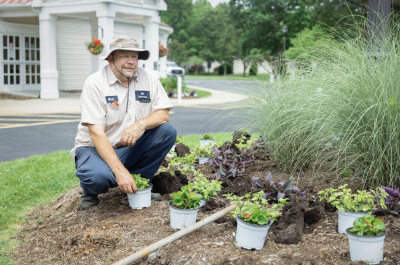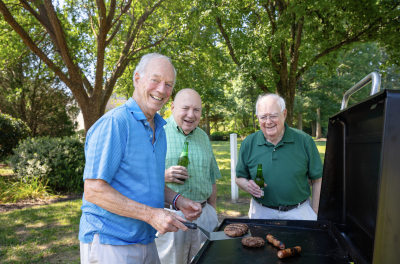Making a senior living decision involves many considerations. To some people, remaining in their current home is paramount. For others, factors like downsizing, moving closer to loved ones, or reducing housing expenses is most important. For older adults who feel that moving to a retirement community is their ideal for senior living, the benefits can include comfort, convenience, and connection.
A low- or no-maintenance lifestyle
 For many residents, one of the most attractive features of living in a retirement community is the ability to relinquish most or all of their home maintenance responsibilities. This can be both a timesaver, freeing up your schedule to do the things you want to do, as well as a cost-savings if you are moving from a larger or older home that requires costly upkeep.
For many residents, one of the most attractive features of living in a retirement community is the ability to relinquish most or all of their home maintenance responsibilities. This can be both a timesaver, freeing up your schedule to do the things you want to do, as well as a cost-savings if you are moving from a larger or older home that requires costly upkeep.
The amount of home maintenance required of residents varies from community to community. In active adult communities or neighborhoods, where the resident owns their home, they may still be responsible for upkeep of doors and windows, as well as the home’s interior. However, tasks like landscaping, shared roof maintenance, and exterior painting are typically included in a monthly homeowner’s association fee in such communities.
In other types of communities, such as continuing care retirement communities (CCRCs or “life plan communities”), there may be even less home upkeep responsibility for the resident. Included as part of the CCRC monthly service fee, these communities may also include interior home maintenance and even perks like housekeeping and linen service. Of course, you’ll want to be sure you understand ahead of time the extent and frequency of these services.
An array of amenities for fun and relaxation
Another attractive aspect of opting to move to a retirement community is the various amenities that cater to residents’ diverse interests. It is common for retirement communities to feature a pool and fitness center, but some communities go well-beyond the basics.
Depending on the retirement community, you might find a golf course, tennis or pickleball courts, hobby rooms like a woodworking shop or craft room, a library, a spa, and/or a game room — just to name a few.
Some communities also have various on-site dining options, which might include restaurants, cafes, pubs, or coffee shops, so, if desired, cooking and dishes can become a thing of the past too. That’s not to say residents can’t continue to cook if they wish. Many floorplans offer a full kitchen. But the monthly service fee will include a meal plan, which would provide for one or more meals each day. Retirement communities are increasingly offering more flexibility around dining plan options.
Accessibility features ensure safety
As people grow older, they may eventually have health or mobility challenges. Sometimes these are short-term, such as recovering from an injury or surgery, while other times they are more permanent. Most retirement communities are conscientiously designed with such scenarios in mind, helping residents safely live independently for longer.
For example, residences almost always have at least one bedroom and one bathroom on the ground level, and many are designed with all living space on a single floor. Additionally, homes and other buildings within the community typically are designed for easier accessibility and mobility.
What’s more, people who opt for a CCRC often have access to a full continuum of care services, should they ever need them. From help with a few activities of daily living to full-time skilled nursing care, many CCRC residents can find peace of mind knowing there is a built-in plan for any future care needs. This is often viewed as a gift to the adult children or other family members who can focus on spending quality time with loved ones rather than carrying much of the burden that often comes with family caregiving.
Socialization for enjoyment as well as health
 Study after study shows the health benefits of socialization as we grow older — as well as the potentially detrimental effects of loneliness and isolation. One could argue that the vibrant social opportunities within a retirement community are among their most important selling points.
Study after study shows the health benefits of socialization as we grow older — as well as the potentially detrimental effects of loneliness and isolation. One could argue that the vibrant social opportunities within a retirement community are among their most important selling points.
From impromptu meetups and happy hours to a bevy of organized programs, events, and outings, retirement communities create opportunities to interact with other residents as much or as little as a person desires. The most vibrant communities are those where residents are planning many of the activities for themselves, with the support of staff as needed. The key is having that easy access to make meaningful connections and cultivate friendships. While the desire for intergenerational living and activities is growing, there is also tremendous benefit for retirement community residents to build a supportive group of peers who share similar life experiences, interests, and needs.
Tapping into the benefits of a retirement community
As older people consider their various senior living options, it is important to factor in elements like budget and location. Some will decide that remaining in their current home is their preference, but others will find the lifestyle of a retirement community more appealing. Some may find after adding up all of the costs of staying in their home, including one-time home repairs and replacements, as well as property taxes, that moving to a retirement community may not cost as much as first thought.
Retirement communities can offer their residents a carefree lifestyle that blends the trifecta of comfort, convenience, and connection. Relishing the freedom of a maintenance-free home, enjoying unique amenities tailored to their preferences, safely navigating their surroundings with ease, and savoring an array of social opportunities, retirement community residents are able to enjoy life on their own terms. But like any organization, there are always some communities that will do a better job than others. This is why doing your research, spending time at the community, getting to know the residents, and even staying on-site for a few days as a guest can go a long way towards understanding the culture, quality of the organization, and the staff.
By myLifeSite
Find out if RWC is a good choice for you
Answer 7 questions to find out if RWC is a good financial fit for you!
